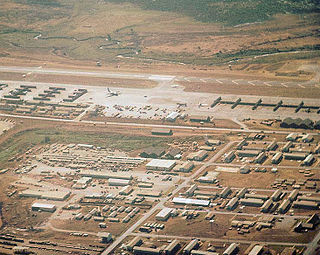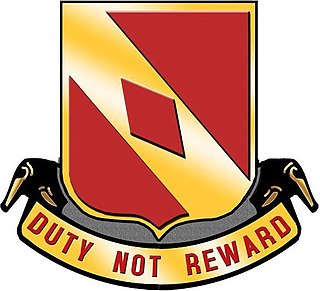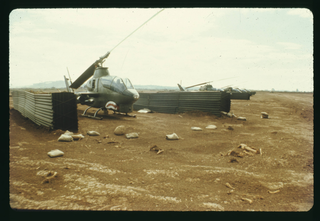
The 1st Cavalry Division is a combined arms division and is one of the most decorated combat divisions of the United States Army. It is based at Fort Cavazos, Texas. It was formed in 1921 and served during World War II, the Korean War, the Vietnam War, the Persian Gulf War, with the Stabilization Force in Bosnia-Herzegovina, in the Iraq War, in the War in Afghanistan as well as Operation Freedom's Sentinel and Operation Inherent Resolve. As of July 2023, the 1st Cavalry Division is subordinate to III Armored Corps and is commanded by Major General Kevin D. Admiral.

Pleiku Air Base is a former air force base in Vietnam. It was established by the Republic of Vietnam Air Force (RVNAF) in 1962 at an undeveloped airstrip, and was used by the United States Air Force during the Vietnam War in the II Corps Tactical Zone of South Vietnam. It was captured by the People's Army of Vietnam (PAVN) in March 1975 and was abandoned for many years. Today, the facility has just redeveloped as Pleiku Airport。

Aerial rocket artillery is a type of armed helicopter unit that was part of the artillery component of the United States Army's two airmobile divisions during the Vietnam War. Controlled by division artillery and not the aviation group, the 2nd Battalion, 20th Artillery, 1st Cavalry Division and the 4th Battalion, 77th Artillery, 101st Airborne Division, along with Battery F, 79th Artillery, 1st Cavalry Division, were the only ARA units fielded during that conflict. The ARA concept disappeared from Army aviation by the mid-1970s, replaced by more generic attack aviation units.

Operation Wheeler/Wallowa was a U.S. offensive operation during the Vietnam War, launched on 11 September 1967 as two separate operations and concluding in November 1968. Initially named as Operation Wheeler and Wallowa, this was merged in November 1967 as Wheeler/Wallowa. The operation was at first conducted by the 101st Airborne Division and 1st Cavalry Division, but it was progressively taken over by 23rd Infantry (Americal) Division.

The 17th Cavalry Regiment is a historical organization within the United States Army that began as a regiment of cavalry after the Pancho Villa Expedition. The unit was constituted on 1 July 1916 in the Regular Army as the 17th Cavalry at Fort Bliss, Texas and originally inactivated 26 September 1921 at the Presidio of Monterey, California. Formerly a part of the 1950s Combat Arms Regimental System, it was reorganized as a part of the U.S. Army Regimental System, an ongoing effort to maintain the lineage and history of the U.S. Army through its units. Today, the 17th Cavalry Regiment is found across the army within the combat aviation brigades, where the squadrons, now constituted as attack/recon helicopter squadrons, carry on the legacy of the 17th Cavalry Regiment.

Khe Sanh Combat Base was a United States Marine Corps outpost south of the Vietnamese Demilitarized Zone (DMZ) used during the Vietnam War.
During the Vietnam War, one unit assigned to the 52nd Combat Aviation Battalion, 17th Combat Aviation Group, 1st Aviation Brigade was the 119th Assault Helicopter Company. The company operated throughout the Central Highlands of Vietnam during the war, from arrival in September 1962 until deactivation in November 1970. Originally designated the 81st Transportation Company, the company was reorganized in 1963 as the 119th Assault Helicopter Company (Airmobile), re-equipped with turbine-powered single-rotor UH-1A and B model Hueys. Also known as the 119th Aviation Company, the company's area of operations included the entire Central Highlands of Vietnam, plus large portions of Laos and Cambodia.

The 17th Aviation Brigade was a military formation of the United States Army. It was originally activated at Nha Trang, Vietnam, as the 17th Aviation Group (Combat) on 15 December 1965 under the 1st Aviation Brigade. Later it moved to Tuy Hoa in November 1970 and then to Pleiku in January 1972. The group had the mission of commanding and controlling all non-divisional assets in II Corps Tactical Zone, under I Field Force. The 10th, 14th, 52d, 223rd and 268th Aviation Battalions as well as the 7th Squadron, 17th Cavalry served with the group.

The 23rd Division of the Army of the Republic of Vietnam (ARVN)—the army of the nation state of South Vietnam that existed from 1955 to 1975—was part of the II Corps that oversaw the Central Highlands.

The 22nd Division of the Army of the Republic of Vietnam (ARVN) was part of the II Corps that oversaw the region of the Central Highlands north of the capital Saigon. The 22nd Division was based in Ba Gi near the south central coast.

The 16th Combat Aviation Brigade is a Combat Aviation Brigade of the United States Army. It is subordinate to 7th Infantry Division and I Corps and based at Gray Army Airfield part of Joint Base Lewis-McChord (JBLM).

The 4th Aviation Regiment is an aviation regiment of the United States Army, tracing its history back to 1957.

The 52nd Aviation Regiment is an aviation regiment of the U.S. Army.
The Battle of Duc Lap took place during the Vietnam War where North Vietnamese forces attempted to overrun the Civilian Irregular Defense Group (CIDG) Duc Lap Camp between 24 and 27 August 1968.

Camp Radcliff is a former United States Army base in the An Khê District in central Vietnam.

Củ Chi Base Camp is a former U.S. Army and Army of the Republic of Vietnam (ARVN) base in the Củ Chi District northwest of Saigon in southern Vietnam.

Ban Me Thuot East Airfield was a military and civilian airfield and army base located approximately 8 km southeast of Buôn Ma Thuột.

Operation Lincoln was an operation conducted by the 1st Cavalry Division west of Pleiku, lasting from 25 March to 8 April 1966, with the goal of locating suspected North Vietnamese and Viet Cong bases to disrupt any planned offensives during the monsoon season.

Kontum Airfield is a former U.S. Army and Army of the Republic of Vietnam (ARVN) base located in Kon Tum in the Central Highlands of Vietnam.
Operation Randolph Glen was a joint U.S. Army and Army of the Republic of Vietnam (ARVN) military operation during the Vietnam War designed to keep pressure on the People's Army of Vietnam (PAVN) units in Thừa Thiên Province and prevent them from mounting any attacks on the populated coastal regions.





















